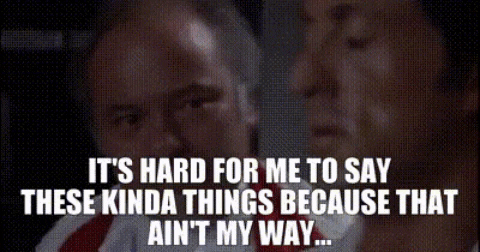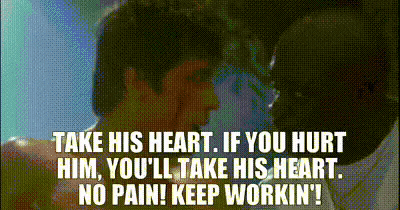JOSEPH CAMPBELL:
The God of Death is The Lord of Sex at the same time.
BILL MOYERS:
What do you mean?
JOSEPH CAMPBELL:
It’s a marvelous thing.
One after another, you can see these gods Ghede, The Death God of the Haitian voodoo, is also The Sex God.
Wotan had one eye covered and the other uncovered, do you see, and at the same time was The Lord of Life.
Osiris, The Lord of Death and The Lord of The Generation of Life.
It’s a basic theme: That Which Dies is Born.
You have to have Death in order to have Life.
Now, this is the origin thought really of the head hunt, in Southeast Asia and particularly in the Indonesian zone.
The head hunt, right up to now, has been a sacred act,
it’s a sacred killing:
Unless there is Death, there cannot be Birth, and a Young Man, before he can be permitted to Marry and Become a Father, must have gone forth and had his kill.
BILL MOYERS:
What does that say to you?
JOSEPH CAMPBELL:
Well, that every generation has to die in order that the next generation should come.
As soon as you beget or give birth to a child, you are the dead one; the child is the new life and you are simply the protector of that new life.
BILL MOYERS:
Your time has come and you know it.
JOSEPH CAMPBELL:
Yeah, well, that’s why there is this deep psychological association of begetting and dying.
BILL MOYERS:
Isn’t there some relationship between what you’re saying and this fact,
that a father will give his life for his son,
a mother will give her life for her child?
JOSEPH CAMPBELL:
There’s a wonderful paper.
I don’t whether you knew it that I would love to talk to this point there’s a wonderful paper by Schopenhauer, who’s one of my three favorite philosophers, called
“The Foundation of Morality.”
There he asks exactly the question that you’ve asked.
How is it that a human being can so participate in the peril or pain of another, that without thought, spontaneously, he sacrifices his own life to the other?
How can this happen?
That what we normally think of as the first law of nature, namely self-preservation, is suddenly dissolved, there’s a breakthrough.
In Hawaii, some four or five years ago, there was an extraordinary adventure that represents this problem.
There’s a place there called the Pali, where the winds from the north, the trade winds from the north, come breaking through a great ridge of rocks and of mountain, and they come through with a great blast of wind.
The people like to go up there to get their hair blown around and so forth, or to commit suicide, you know, like jumping off the Golden Gate Bridge.
Well, a police car was on its way up early, a little road that used to go up there, and they saw just beyond the railing that keeps cars from rolling over, a young man actually clearly about to jump and prepare himself to jump.
The police car stopped.
The policeman on the right jumps out to grab the boy, and grabs him just as he jumped and was himself being pulled over, and would have gone over if the second cop hadn’t gotten around, grabbed him and pull the two of them back.
There was a long description of this, it was a marvelous thing, in the newspapers at that time.
And the policeman was asked, “Why didn’t you let go? I mean, you would have lost your life?”
And you see what had happened to that man, this is what’s known as one pointed meditation everything else in his life dropped off. His duty to his family, his duty to his job, his duty to his own career, all of his wishes and hopes for life, just disappeared and he was about to go. And his answer was, “I couldn’t let go. If I had,” and I’m quoting almost word for word, “if I’d let that young man go, I could not have lived another day of my life.”
How come?
Schopenhauer’s answer is, this is the breakthrough of a metaphysical realization that you and the other are one.
And that the separateness is only an effect of the temporal forms of sensibility of time and space.
And a true reality is in that unity with all life.
It is a metaphysical truth that becomes spontaneously realized, because it’s the real truth of your life.
Now, you might say the hero is the one who has given his physical life, you might say, to some order of realization of that truth.
It may appear that I’m one with my tribe, or I’m one with people of a certain kind, or I’m one with life.
This is not a concept; this is a realization, do you see what I mean?
BILL MOYERS:
No, explain it.
JOSEPH CAMPBELL:
And the concepts of love your neighbor and all are to put you in tune with that fact, but whether you love your neighbor or not, bing, the thing grabs you and you do this thing.
You don’t even know who it is.
That policeman didn’t know who that young man was.
And Schopenhauer says in small ways you can see this happening every day all the time.
This is a theme that can be seen moving life in the world, people doing nice things for each other.
BILL MOYERS:
What do you think has happened to this mythic idea of the hero in our culture today?
JOSEPH CAMPBELL:
It comes up in an experience.
I think, I remember during the Vietnam war, seeing on the television the young men in helicopters going out to rescue one of their companions at great risk to themselves.
They didn’t have to rescue that young man; that’s the same thing working.
It puts them in touch with the experience of being alive.
Going to the office every day, you don’t get that experience, but suddenly you’re ripped out into being alive.
And life is pain and life is suffering and life is horror, but by God, you’re alive and it’s spectacular. And this is a case of being alive, rescuing that young man.
BILL MOYERS:
But I also know a man who said once, after years of standing on the platform of the subway,
“I die a little bit down there every day, but I know I’m doing so for my family.”
There are small acts of heroism that occur without regard to the nobility or the notoriety that you attract for it.
JOSEPH CAMPBELL:
That’s right, that’s right.
BILL MOYERS:
And the mother does it by the isolation she endures in behalf of the family, of raising…
JOSEPH CAMPBELL:
Motherhood is a sacrifice.
On our veranda in Hawaii, there are little birds that come that Jean likes to feed.
And each year there have been one or two mothers, mother birds.
And if you’ve ever seen a mother bird plagued by her progeny for food, that the mother should regurgitate their meal to them, and the two of them, or five of them in one case, flopping all over this poor little mother, they bigger than she in some cases, you just think, well, this is the symbol of motherhood.
This is just giving of your substance, every thing, to this progeny.
There should be it in marriage.
A marriage is a relationship.
When you make a sacrifice in marriage, you’re not sacrificing to The Other, you’re sacrificing to The Eelationship.
And this is symbolised, for example, in that Chinese image of the tai chi, the tao, you know, with the dark and the light interacting, it’s a well-known sign.
That is the relationship of yang and yin, male and female, which is what a marriage is.
And that’s what you are, you’re no longer This,
you’re The Relationship.
And so marriage, I would say,
is not a love affair, it’s An Ordeal.
BILL MOYERS:
An ordeal?
JOSEPH CAMPBELL:
The ordeal is sacrifice of ego to the relationship, of a two-ness which now becomes the one.
BILL MOYERS:
One not only biologically but spiritually,
and primarily spiritually.
JOSEPH CAMPBELL:
Primarily spiritually.
BILL MOYERS:
But the necessary function of marriage, in order to create our own images and perpetuate ourselves in children, but it’s not the primary one, as you say.
JOSEPH CAMPBELL:
No, that’s really just the elementary aspect of marriage.
There are two completely different stages of marriage.
First is the youthful marriage, following the wonderful impulse, you know, that nature has given us, in the interplay of the sexes biologically.
And in the reproduction of children.
But there comes a time when the child graduates from the family, and the family is left.
I’ve been amazed at the number of my friends who in their forties or fifties go apart, who have had a perfectly decent life together with the child, but they interpreted their union in terms of relationship through the child.
They did not interpret it in terms of their own personal relationship to each other.
BILL MOYERS:
Utterly incompatible with the idea of 'Doing One’s Own Thing'?
JOSEPH CAMPBELL:
It’s not one’s own thing, you see.
It is in a sense one’s own thing,
but the one isn’t just you, it’s the two together.
And that’s a purely mythological image, of the sacrifice of the visible entity for a transcendent unit, cracking eggs to make an omelet, you know?
And by marrying The Right Person,
we reconstruct the image of the incarnate god,
and that’s what marriage is.
BILL MOYERS:
The right person. How does one choose the right person?
JOSEPH CAMPBELL:
Your heart tells you; it ought to.
BILL MOYERS:
Your inner being.
JOSEPH CAMPBELL:
That’s the mystery.
BILL MOYERS:
You recognize your other self.
JOSEPH CAMPBELL:
Well, I don’t know, but there’s a flash that comes and something in you knows that this is the one.





